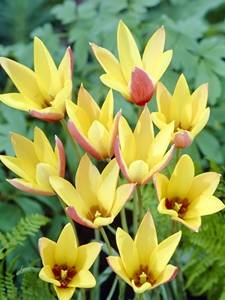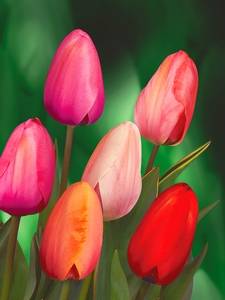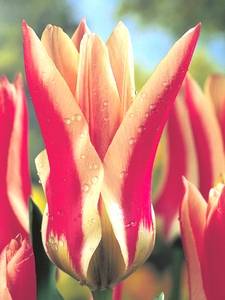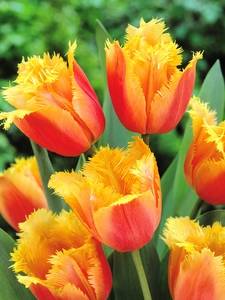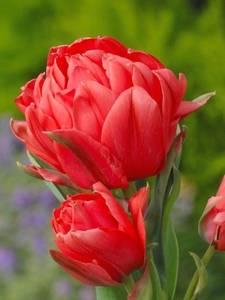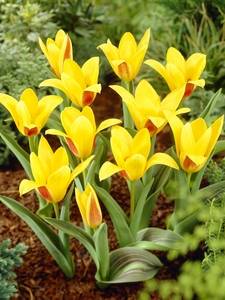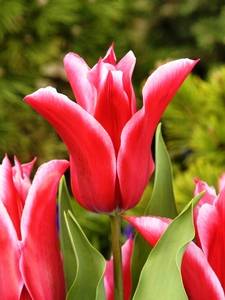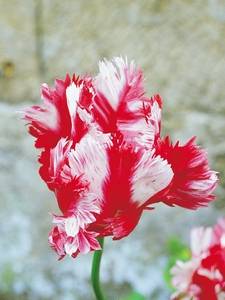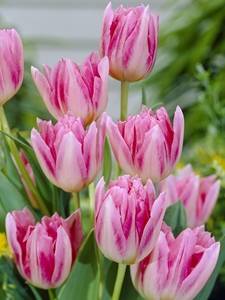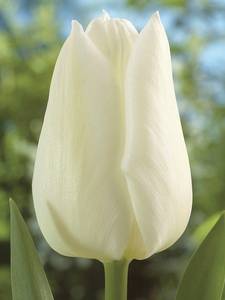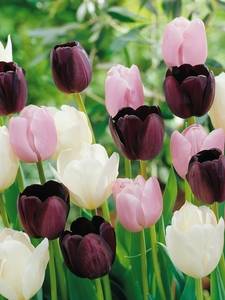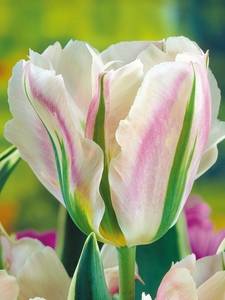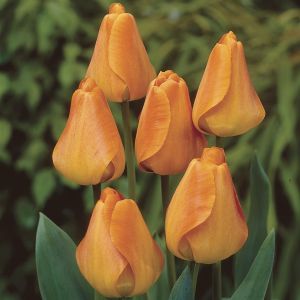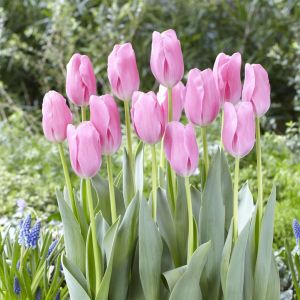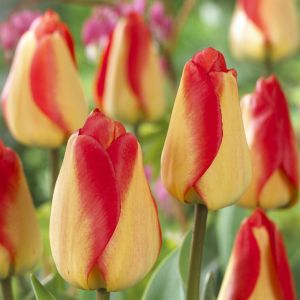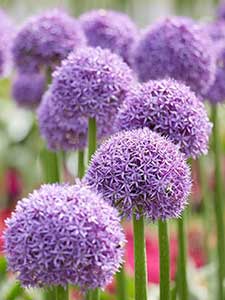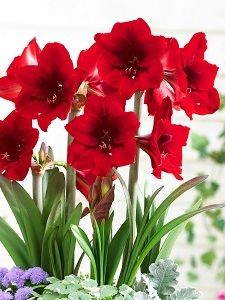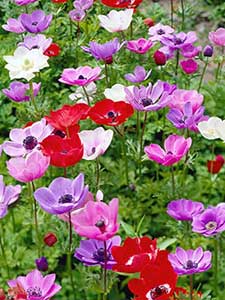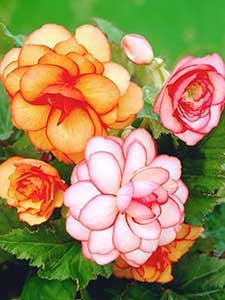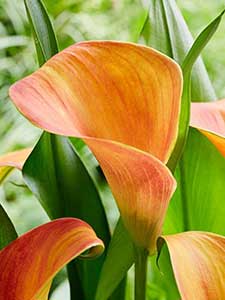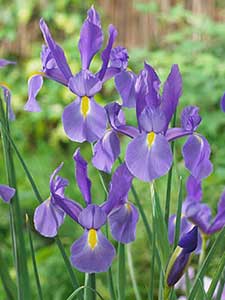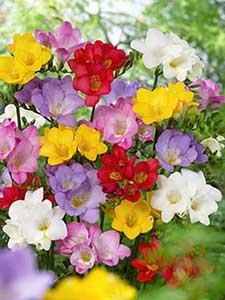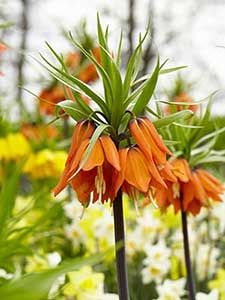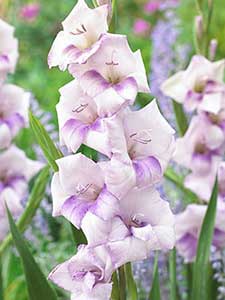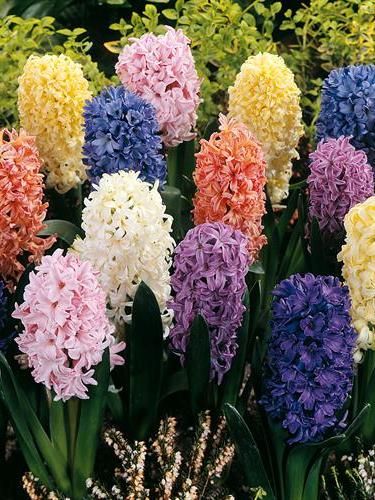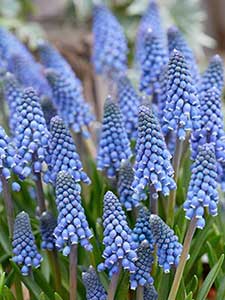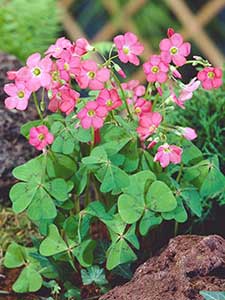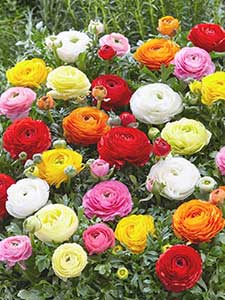Tulips
Tulip bulbs are typically planted in the fall, and they remain dormant throughout the winter. In the spring, when the weather warms up, the bulbs begin to sprout, and the plants produce their characteristic colorful, cup-shaped flowers. Tulip bulbs are easy to grow and care for, and they are a popular choice for gardens and floral arrangements. They come in a wide range of colors, including red, pink, purple, yellow, and white, and they are a symbol of the arrival of spring and the end of the cold winter season.
Tulip Flower Bulbs have been cultivated in Holland since the 17th century
The relentless care and crossing between species has given us the enormous assortment of beautiful tulips we have today. It all began with a single dwarf tulip from the mountains of Kazakhstan, brought via Turkey to the Botanical garden of the University of Leiden in Holland, after a burglary at the gardens these tulip bulbs spread all over the country.
At one time a single tulip bulb costed as much as a house in Amsterdam. Since then many different varieties of tulip bulbs have been cultivated in Holland and we have a large assortment of different types to fulfill all your needs.
We deliver our tulip flower bulbs direct from the fields of Holland, our tulip bulbs are excellent quality because they are supplied to you freshly dug from the fields, they haven't been stored in shops and sheds.
Choose your favourites from our wide assortment of tulip bulbs.
How to plant tulip flower bulbs
Plant tulips after you have made a plan or colour scheme of what to flower where and consider the eventual height of the Tulip variety (taller ones in the back shorter ones in front ). Choose a few different Varieties for a succession of flowers from March until May. For best results plant them in large groups.
Tulips grow best when planted in fertile, well drained, Soil in a sunny location, they need to be sheltered from strong winds. They should be planted from October until December.
Use a firm plant Trowel to loosen up the Soil and create for example circular planting beds (for 20 tulips a 40 cm wide circle ) take the Soil out to a depth of approx 3 times the height of the bulb deep, plant the tulips in the circle always with the smallest part upwards. Push the bulbs firmly in the loose Soil making sure not to leave any air pockets. Cover the bed with the removed topsoil and finally with a layer of mulch.
In colder area's, a layer of mulch will protect them from frost damage. In warmer climates, a layer of mulch will help to retain an optimal moisture level. The mulch can be either shredded bark, compost or straw.
When the tulips are finished flowering resist the temptation to remove the unsightly foliage as this yellowing foliage will provide the bulb with food and energy for next year.
Except for the naturalising bulbs, it is best to dig up you bulbs after their foliage has died down (approx 6 weeks after flowering). If you don't, some will reappear next year, but with less and smaller flowers.
Once you have dug up your bulbs they should be allowed to dry out, before being wrapped in Newspaper and stored in a cool, dry, dark place until the following autumn.
Look into our special varieties such as Viridiflora, Fringed Fosteriana Tulips
We deliver our Tulip Flower Bulbs direct from the fields for best quality, without any interference and delays caused by storage in shops and sheds. Have a look at our wide assortment, we offer from Parrot Tulips to Species Tulips in a wide range of cultivars.
Darwin hybrid tulips are a cross between Darwin and Fosteriana tulips
They have large flowers in lovely colour tones on strong stems. Most Darwin hybrid tulips have a light vanilla scent.
Darwin hybrid flower heads are known for their square bottom, on which the petals arch into a perfect triangle shape when closed. Darwin hybrid tulips bloom on strong stems mainly between mid to end of April.
Double early tulips flower from mid April just after single early flowering tulips
Double early flowering Tulip Flower Bulbs go way back in tulip history, some of the old varieties such as William of Orange and Murillo are still on sale to day. Double early tulips produce large, double flower heads sometimes as much as 10cm wide on quite short stems so they can survive bad weather. The soft colour tones of Double early flowering Tulips mix very well with blue grape hyacinths, creating carpets of colour. Double early flowering tulips are great for mass planting in large flower beds and they do well in containers.
Double late, these Paeony or double late flowering tulips are not so common, but of great beauty to your garden
The huge flower heads dominate your late April - May border. Some varieties, once in full bloom, might reach the size of a dinner plate!
Single late Tulips are among the favourites of many gardeners and florists
They bloom with egg-shaped flowers in lovely colour tones. The big flowers are born onto tall strong stems; they build a bridge between the colour explosion of spring and the May flowering plants in your border. They’re highly recommendable and will create a focal point in your late April - early May borders. Works well when you plant them with Darwin Tulips
Triumph Tulips are a cross between single early tulips and late flowering tulips
They’re being considered as the most important group of tulips in culture. The range of colours and shapes is enormous; the flowers are born onto strong stems and are well suited for the garden. Triumph tulips flowers from mid April onwards until end of the month, for a continuous flowering plant Triumph, Darwin hybrids, single late and Lily flowering tulips for an ongoing cascade of flowers from mid April well into May
Fosteriana tulips a real must for every spring garden
Fosteriana tulips play a big role in the modern tulip-breeding world. They are parent to the highly famous Darwin hybrid tulips. The Fosteriana Tulip Flower Bulb produces large, elegantly shaped flower heads; they blossom with strong, dominant colours and are mildly fragrant. The huge flower heads, once open fully, have the size of a dinner plate.
Fringed or Icicle Tulips are an elegant element in the late spring garden
The fringing of these Tulip petals is caused by a mutation in Nature. Breeders have picked this up and now we have a whole range of lovely fringed Tulip Flower Bulbs. They make great border tulips, mostly on medium to taller stems (40 - 60 cm) and come in a wide range of colours For Ah's and Oh's in your garden next spring, just plant them, success guaranteed! They bloom mid April to end of April
Kaufmanniana tulips are great to colour your early spring border
They often produce bi-coloured tulips blossom with strong colours, thus enhancing your spring borders. Also planted in pots and tubs they will do great. Plant them at such a location that they can remain there, as they will re-bloom the next season too.They do not need lifting and will spread over the years
Lily Flowering Tulips are highly unusual and very elegant.
The fine shaped flowers blossom in lovely colours from bi-coloured tones to soft pastel colours. The flowers are born onto medium to tall strong stems; they blossom from mid April onwards until almost the end of the Tulip season. It's a highly rewarding strain of tulips for a different border.
Parrot Tulips are among the oldest tulip types in culture since the 17th century.
They derive from spontaneous mutations, for example the Triumph Tulips and Darwin Tulips. The deep incised flowers bloom in great colours often with a tinge of green on the outer petals. Look for example to Tulip Green Wave, or Rococo, they are just marvellous. Plant them at a sheltered location as the flowers get very big, some support might be wanted.
Viridiflora tulips do well when planted with pansies, it give a lovely accent to your border
This fine strain of tulips for the mid to late flowering border has a unique combination of colours, for example white blushed pink and a green flame over the petals. They stand out in shape of the flower, their sturdiness (strong stems) and sheer beauty.
Species tulips are real garden gems
They go way back to the original tulips found by explorers in the wilderness of the Turkmenistan and Kazakhstan Mountains, the birthplace of our modern tulips. See what we have bread from the original species to the modern tulip. Get this piece of history in your own garden and enjoy the sheer beauty of these fine almost wild tulips.
